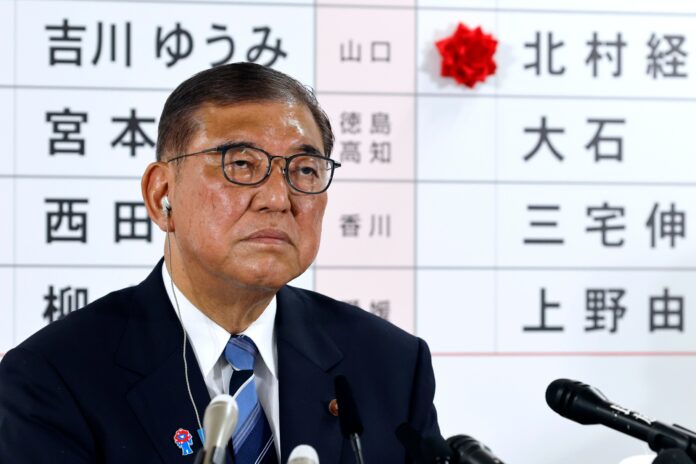He has no majority, no mandate, and no momentum. But Shigeru Ishiba, Japan’s embattled Prime Minister, has no intention of stepping aside. After a resounding electoral rout that left his coalition stranded in both houses of Parliament, Ishiba clings to power—with neither a plan nor a clear successor in sight.
Ishiba clings to power: Between denial and political paralysis
The July 20 senatorial elections redrew the Japanese political landscape, and not in Ishiba’s favour. The ruling Liberal Democratic Party (LDP), aligned with its traditional partner Komeito, secured only 47 of the 125 contested seats. This leaves the coalition with 122 seats in total, below the 125 required for a simple majority in the upper house. Crucially, it also confirms what many analysts feared: the government is now in the minority in both chambers of the Diet for the first time since 1945.
A Prime Minister in denial
Despite the numbers, and the mounting pressure, Ishiba, 68, gave no indication of stepping down. “That is correct,” he replied tersely when asked by local media if he intended to remain in office. Citing the urgency of upcoming U.S. tariff threats due on August 1, Ishiba insisted the government must “do its utmost, in good conscience, until then.”
Behind closed doors, party leaders are reportedly divided. The LDP’s Secretary-General Hiroshi Moriyama urged stability: “There may be talk of replacing him, but no clear successor exists,” he told reporters, echoing concerns that leadership change could deepen the vacuum.
A government adrift: minority rule and policy deadlock
Since last autumn’s ill-fated snap legislative elections, called by Ishiba himself, the LDP has governed as a minority in the lower house. The loss of the upper house compounds the crisis. Legislation now requires cross-party support in an environment of fractious opposition and mounting public discontent.
While the Constitutional Democratic Party and Democratic Party for the People gained seats, it was the hard-right populist Sanseito that delivered the real electoral shock: jumping from 2 to 14 seats. With its fiercely anti-immigration, anti-globalist platform, and calls to reverse green and health policies, Sanseito now threatens the LDP’s voter base directly.
Inflation, tariffs, and crumbling trust
June inflation hit 3.3% excluding fresh food, driven by a staggering 100% year-on-year spike in rice prices, an explosive political issue in Japan. Ishiba’s emergency response, subsidies, housing aid, energy grants, and the release of rice reserves, has so far failed to contain prices. Markets remain jittery, not just over food, but debt.
Tokyo’s recent bond auctions were met with lukewarm investor interest, sending yields soaring. The government’s fiscal discipline is now under serious scrutiny, with Ishiba’s stimulus-heavy policies pushing national debt past the comfort zone of even Japan’s own central bank.
Trade war looms: Trump’s tariffs rattle Tokyo
At the heart of Ishiba’s insistence on staying lies Washington. Former President Donald Trump, now in his second term, has reimposed aggressive tariff policies. U.S. imports of Japanese vehicles, a cornerstone of the economy, have already plummeted 25%. The threat of a 25% blanket tariff by August 1 looms.
Tokyo’s chief negotiator, Ryosei Akazawa, is heading to Washington for an eighth round of last-minute talks. “The election result has no impact on negotiations,” he claimed at Haneda airport, but few in the LDP believe that. Economic dependency on exports, and on American goodwill, has rarely looked more precarious.
Paralysis in the archipelago
That Ishiba clings to power is not surprising; Japan’s political culture is defined by inertia and factional caution. But that he does so without parliamentary backing, amid inflation, trade threats, and rising nationalist challengers, points to a deeper malaise.
Japan has entered uncharted territory: a double minority government led by a weakened Prime Minister, facing external pressure from the United States and internal revolt from his own base. Whether Ishiba survives the month, or merely delays the inevitable, one thing is certain, Japan’s postwar political equilibrium is fracturing.



